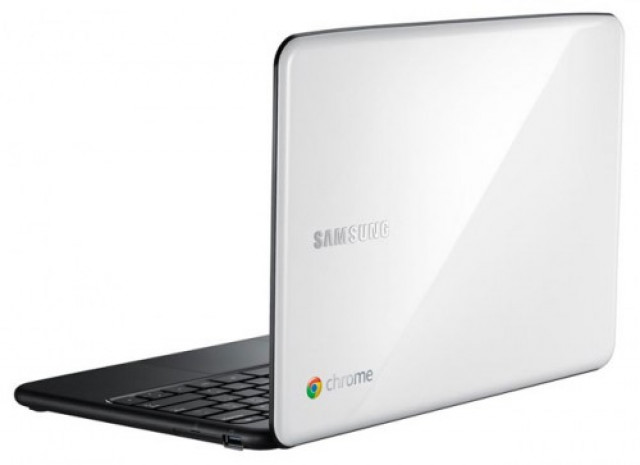Google has designed the Chromebook to utilize the power of cloud computing (a revolutionary concept to centralize the information for internet users around the world so that any information is accessible throughout the world regardless of the hardware and software used) where most of the traditional applications that we use will be available on the internet rather than on the local hard drive.
This means that most of the work we do on personal computers require an internet connection plus word processing, photo editing, creating archives, etc. Chromebook was announced for sale in May 2011 and the shipping started from June 2011. Currently the device is only available on Amazon.com and Bestbuy.com and it will take some time to reach the Pakistani market.
[[http://www.youtube.com/watch?v=TVqe8ieqz10]]
Why is Chromebook special?
It's not! It is a netbook that is shipped with the Google Chrome OS, which uses the Linux kernel and the famous Google Chrome web browser. According to Google, the machine is capable of booting in just 8 seconds, which is pretty awesome and one of its strong features.
[[http://www.youtube.com/watch?v=akZ7huEkFRQ]]
Though Google thinks that idea behind Chromebooks is promising, I think otherwise.
Currently, the world has changed its focus to cloud computing, which has gained excellent momentum, of which Google itself is a major part. The internet giant has some of the best cloud computing products under its belt: Google Docs, Picasa Web Albums, Picnik photo editing, etc to name a few.
For users around the world, the whole cloud computing concept is a favorable one, where they can access applications and save their information using personal IDs (or an OpenID) regardless of the operating system or the internet browser they use. This is obviously a win-win situation. But the point is that at this point, no one has completely shifted themselves to the applications available online. Instead, they are using it in combination with the applications that they have installed locally on their PCs. I am pointing this out as I am myself an avid fan of cloud computing but happen to use most of these online applications in combination with the other software installed on my PC. Moreover, keeping in mind the current infrastructure the world has at its disposal, cloud computing apps will have their limitations.
According to NetIndex.com, the mean download speed (the information received at the user’s end) of internet users around the world is 8.69 Mbps. This figure converts to something around 1 MB/s that is far less than a USB 2.0 flash drive WRITE speed.
If you have executed some portable applications directly from a USB drive, you may have noticed short lags they generate due to the limitation of write speed that a typical flash drive allows. This can be compared to the online apps when they try to push some heavy data at the user’s end. So in short, this figure itself portrays the limitation of cloud applications, when compared to a locally installed application which can deliver the results at users end much faster. Now compare the situation with a netbook completely relying on an internet connection to do its homework.
This is where my point goes for the Google's Chromebook.
Moreover, market analysts are pointing out the futile nature of the device when Google has successfully launched its very own Android OS for tablets. Google is itself going towards market fragmentation by setting the Chromebooks to compete with the Android based devices in the market. Furthermore, more and more people are trending towards tablets while Google is now encouraging them to start with their netbooks again.
While Google’s whole idea of cloud computing may become the next big thing in the tech world, it will have its limitations. Many expert analysts have pointed out that this whole idea of storing the world’s information on the internet can pose a serious threat to users’ privacy and protection. Internet is a world in itself and a single successful hacking attempt can release large amounts of data, documents, pictures, files, etc which violates privacy, and in some cases, the security of the user.
Once again back to reality.
Comparing a Chromebook with a typical netbook offered by companies such as HP and Dell, we have the following results:
| A typical HP Netbook: | A Google Chromebook: |
| - Intel Atom N570 (1M Cache 1.66 GHz) New Dual Core Atom | - Intel Atom N570 (1M Cache 1.66 GHz) New Dual Core Atom |
| - 1GB RAM | - 2 GB RAM |
| - 320 GB Harddrive | - 16 GB SSD |
| - 10.1 screen | - 12.1 screen |
| - Windows 7 starter | - Google Chrome OS |
| - WLAN, Bluetooth and WebCam | - WLAN, Bluetooth and WebCam |
| - Price: USD 350+ | -Price: USD 350+ |
| - Local and free apps | - Apps available on the internet |
So the main difference is the amount of space available for local applications.
This means that a typical netbook has more space for all your music, DVD movies and the plus point is that you have better and faster applications and the same old internet access.
So, from a programmers point of view, I can have my Visual Studio, Eclipse, Microsoft Office 2010 and Photoshop while I have still got space for all my music and movies (the Intel Atom N570 processor has enough capabilities to run all these applications decently). And God forbid, if there is an internet outage, I can still remain alive with my netbook.
On the contrary, a Chromebook offers an incredibly low boot time, the ability to wake from sleep mode in mere seconds, an array of free applications available through an internet connection (the possibility of downloading more apps from the Web Store), and an operating system that is less prone to virus/malware attacks.
In the end, it is your decision to go for a Chromebook, a netbook, an iPad, or tablets, depending on what suits your personal needs and choices.



COMMENTS
Comments are moderated and generally will be posted if they are on-topic and not abusive.
For more information, please see our Comments FAQ